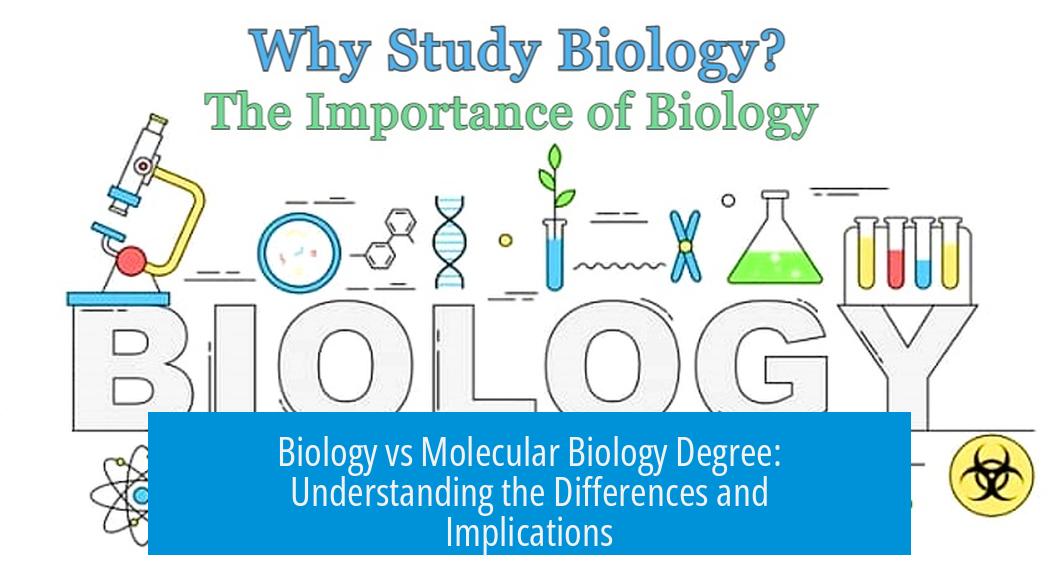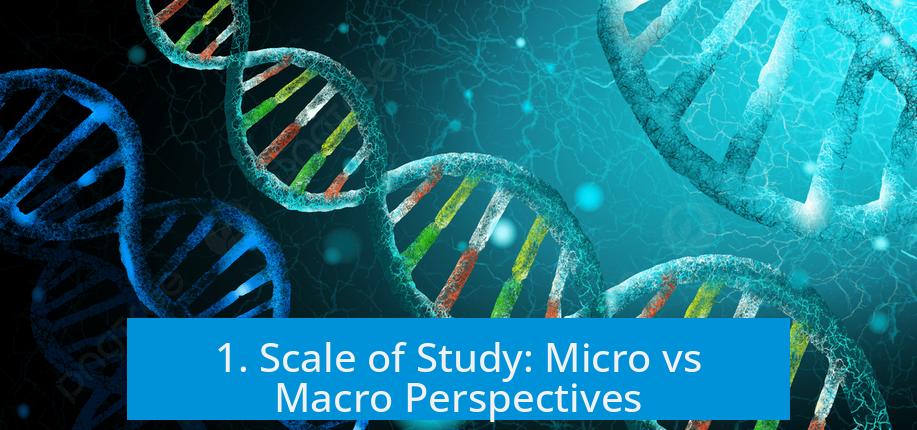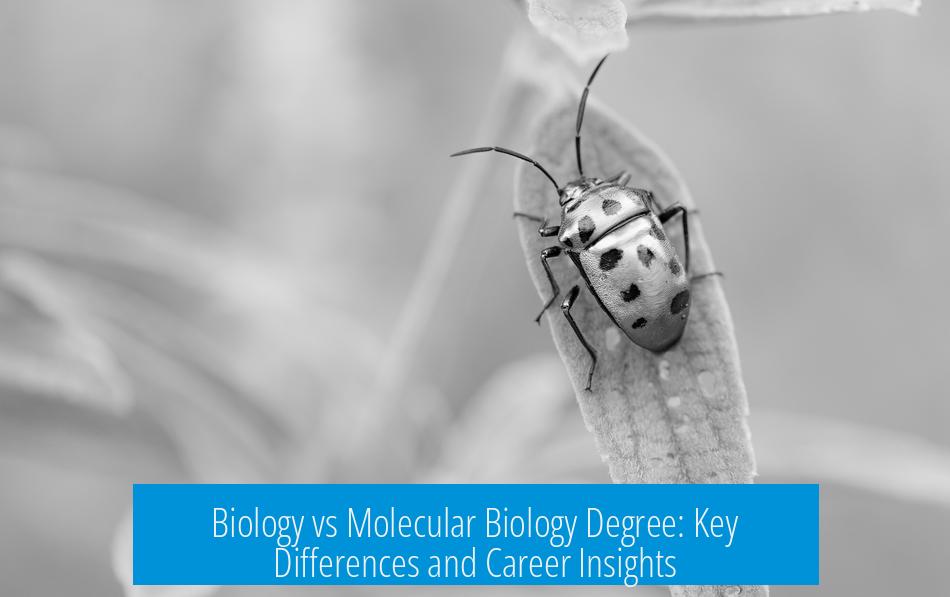Biology vs Molecular Biology Degree: Understanding the Differences and Implications

The key distinction between a Biology degree and a Molecular Biology degree lies in the scale and depth of study. Molecular Biology focuses on microscopic processes such as genetics, cell signaling, and molecular interactions. Biology covers a broader range, including ecological systems and organismal studies.
1. Scale of Study: Micro vs Macro Perspectives

Biology and Molecular Biology degrees differ significantly in their focus areas, especially in the final years of study. Molecular Biology dives deep into internal cellular mechanisms and molecular structures. It emphasizes subjects like pathology, developmental biology, genetics, and cell signaling.
Meanwhile, general Biology concentrates on larger biological systems. This includes ecology, environmental biology, and entomology, where students learn about relationships among organisms and their environments.
- Molecular Biology: Cellular and molecular processes, genetics, epidemiology.
- General Biology: Ecosystems, organismal behavior, environmental interactions.
2. Coursework Differences and Challenges
The coursework in Molecular Biology often includes rigorous biochemistry classes. Biochemistry stands out as one of the most challenging components for Molecular Biology students, especially in advanced years. Although related programs, such as Microbiology, might avoid extensive biochemistry courses, Molecular Biology usually demands a strong grasp of this subject.
In contrast, general Biology degrees feature a more diverse curriculum with fewer biochemical requirements. The overlap between the degrees means that many courses are shared, but a few specialized subjects distinguish them.
| Degree | Core Coursework | Difficulty Level |
|---|---|---|
| Molecular Biology | Biochemistry, Genetics, Molecular Techniques | High – Especially biochemistry |
| Biology | Ecology, Evolution, Organismal Biology | Moderate |
3. Academic and Career Considerations
Biochemistry Stress Factor
Molecular Biology’s biochemical focus subjects students to rigorous study loads. Biochemistry courses can be mentally taxing. Students pursuing this path should brace for significant academic pressure.
Job Market Realities
Both Biology and Molecular Biology graduates face a saturated job market. Academic and industry positions are limited compared to the number of graduates. Many end up in research assistant roles with low pay or jobs unrelated to their degree.
The biotech and pharmaceutical industries, which typically absorb many Molecular Biology graduates, face economic downturns. Contributing factors include:
- Depression crisis impacting funding.
- Productivity issues in drug development.
- Reproducibility challenges in research.
- Pressure from “publish or perish” culture.
- Decline in available funding.
The industry’s recovery may take 5-10 years, influencing job availability and stability.
Importance of Advanced Degrees
Obtaining advanced or professional degrees enhances employment prospects. Degrees such as MD, PA, BSN, PharmD, or master’s programs open doors to specialized roles. Employers often seek candidates with expertise aligned to current industry needs.
Students should focus on maintaining a strong GPA, especially in Molecular Biology, where grading can be tougher. Laboratory experience is also critical. Hands-on familiarity with industry-relevant techniques improves job prospects.
4. Laboratory Experience
Practical laboratory skills represent a vital part of training. Experience with standard tools and methodologies used in research labs and industry significantly benefits graduates. This skill set often differentiates candidates in competitive job markets.
- Techniques in DNA analysis, cell culture, and molecular assays.
- Use of spectrophotometers, PCR machines, and electrophoresis.
- Data analysis using bioinformatics software.
5. Advice on Degree Selection
Students have time to explore their interests before finalizing a degree track. Taking introductory courses in different fields, such as microbiology or ecology, can clarify preferences. A flexible approach helps align academic choices with career goals.
Institutional policies also vary. For example, some universities may have strict requirements about course completions and exam attempts. Understanding the academic framework within one’s country or university is essential before committing to a degree.
6. Employer Perception and Degree Similarity
Numerous universities offer Biology and Molecular Biology as closely overlapping degrees. Employers often do not distinguish clearly between the two on resumes. The practical skills and knowledge gained matter more than the specific degree title.
Therefore, concerns about exact degree naming should be secondary to skill acquisition, academic performance, and relevant experience.
Summary of Key Points
- Scale: Molecular Biology focuses on microscopic life; Biology covers broader ecosystems and organisms.
- Course Differences: Molecular Biology demands intense biochemistry study; Biology offers flexible topics.
- Career Outlook: Both fields face competitive markets; advanced degrees and experience improve prospects.
- Stress Levels: Biochemistry courses contribute to high stress in Molecular Biology.
- Lab Skills: Practical experience with industry tools is critical for employability.
- Degree Choice: Students should explore interests and consider institutional policies before deciding.
- Employer Views: Most do not differentiate strongly between these degrees.
What is the main difference between a Biology and a Molecular Biology degree?
Biology studies larger life forms and ecosystems. Molecular biology focuses on the small scale, like genetics, cell signaling, and pathology. The key difference appears from the third year of study onwards.
Does the choice between these degrees affect job prospects?
The job market is tough for both fields. Many graduates work underpaid or in unrelated jobs. Advanced degrees and lab experience improve chances in biotech and pharma industries.
Is biochemistry harder in a Molecular Biology degree?
Yes, biochemistry can be very challenging in molecular biology programs. It often causes significant stress, especially in upper years of the degree.
Should I be worried about GPA when choosing between these degrees?
If you expect a lower GPA in molecular biology, general biology might be better. GPA and lab experience matter most for graduate schools and employers.
How important is laboratory experience for biology-related jobs?
Lab experience is crucial. Using industry-standard tools and techniques boosts employability after graduation, especially with only a bachelor’s degree.
Can I switch between Biology and Molecular Biology during my studies?
Yes, many universities allow students to explore courses before deciding. However, course and exam rules vary by country and institution, so check specific policies before switching.





Leave a Comment